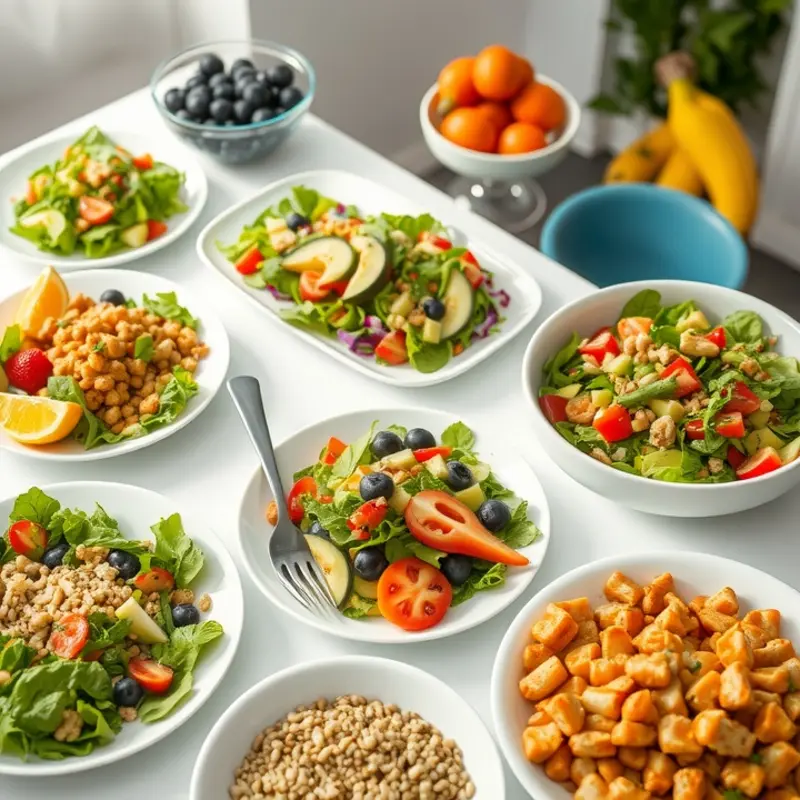Understanding the profound relationship between nutrition and stress can empower health-conscious adults to make smarter dietary choices. By recognizing how certain foods impact our body and mind, we can cultivate a lifestyle that not only promotes physical well-being but also supports emotional resilience. In the following chapters, we will explore the essential nutrients that can help mitigate stress and the importance of a balanced diet in achieving overall wellness.
The Nutrient-Stress Connection

Stress can significantly take a toll on mental well-being, but certain nutrients can be a valuable ally. Understanding the specific nutrients that play pivotal roles in managing stress is crucial for those seeking a calmer, more balanced life. Key players include antioxidants, omega-3 fatty acids, magnesium, and B-vitamins.
Antioxidants are powerhouse molecules that combat oxidative stress, which can escalate feelings of anxiety. By neutralizing free radicals in the body, they prevent cellular damage and promote brain health. Fruits and vegetables, particularly berries, dark leafy greens, and nuts, are rich in antioxidants. Integrating a colorful array of produce into daily meals not only enhances flavor but also boosts defense against stress.
Omega-3 fatty acids, predominantly found in fatty fish, flaxseeds, and walnuts, are vital for brain health. These essential fats are known to reduce inflammation and promote a balanced mood by enhancing communication between brain cells. In fact, they are linked to lower levels of stress hormones and better overall emotional regulation. Consider incorporating a couple of servings of fish per week or sprinkle flax seeds over your breakfast for an omega-3 boost.
Magnesium is a mineral that plays a direct role in your stress response. Low levels of magnesium can trigger feelings of tension and anxiety. Foods rich in magnesium include whole grains, legumes, seeds, and leafy greens. Cooking with these ingredients not only enriches meals but also fortifies the body’s stress defenses naturally. For quick meal ideas, feel free to explore minimal prep dinner ideas.
B-vitamins, particularly B6, B12, and folate, are closely associated with nervous system health. These vitamins aid in the production of neurotransmitters like serotonin, which are crucial for mood regulation. Deficiencies can lead to increased stress and irritability. Eggs, dairy products, beans, and lentils provide a good source of B-vitamins, ensuring your neurotransmitters stay balanced and effective.
Integrating these nutrients requires mindful meal planning. Aim for meals that include a variety of these stress-busting foods. This dietary strategy not only contributes to physical health but also supports mental resilience. Opt for snacks like a handful of nuts or a serving of yogurt to maintain nutrient levels throughout the day.
The synergy between nutrition and stress is compelling. A conscious effort to consume foods rich in antioxidants, omega-3s, magnesium, and B-vitamins can yield tangible benefits for emotional health. As we continue our exploration of balancing nutrition and stress, we realize the profound impact that dietary choices have on our mental well-being.
Practical Strategies for Nutritional Balance

Achieving nutritional balance is more than just eating healthily; it’s about creating meals that calm the mind and body. Integrating stress-relieving foods into your daily diet can transform your kitchen into a source of tranquility. Start by planning your meals with intention, focusing on ingredients known for their soothing properties.
Consider incorporating foods rich in omega-3 fatty acids, like flaxseeds and walnuts, which are known to reduce anxiety. A simple salad peppered with these ingredients, paired with leafy greens, can be both nutritious and calming. Learn more about whether fish oil is necessary for your diet within our nutrition guide.
For meal planning, batch cooking can be immensely helpful. By preparing larger quantities of complex carbohydrates like quinoa or sweet potatoes, you effectively manage blood sugar levels, reducing stress. These ingredients are versatile and can be mixed with vegetables and flavored with herbs, such as rosemary, which is great for mood stability. This not only saves time but also ensures you have nourishing options readily available.
Mindful eating is another cornerstone of reducing stress through diet. It involves being present while eating and savoring each bite. Slow down your meals by focusing on flavors, textures, and the effort that went into making your food. This practice helps in recognizing when you’re truly hungry versus stress-eating out of habit.
Including easy-to-make recipes in your routine that offer both nutrition and comfort can be revolutionary. Consider a creamy avocado toast, layered with hemp seeds and a squeeze of lemon, for a breakfast that’s both rejuvenating and filling. Avocado is packed with healthy fats that stabilize the mood while lemon refreshes the palate, setting a positive tone for the day.
When cooking, experiment with stress-relieving ingredients like ginger and turmeric, which are known for their anti-inflammatory properties. A soothing golden milk, prepared with warmed plant-based milk, turmeric, ginger, and a dash of honey, can be a perfect evening ritual, easing tension and promoting restful sleep.
Remember that meal preparation starts with more than just buying and cooking; it extends into your storage solutions. Keeping your kitchen organized can simplify your cooking experience. Carefully plan by keeping essential items in easily accessible positions, reducing the chaos that often accompanies meal prep. This attention to detail turns your kitchen into a sanctuary, enhancing your cooking process with peace and efficiency.
By applying these strategies, you can cultivate a kitchen environment that supports both your mental and physical well-being. The transformation starts with simple, mindful changes that prioritize your comfort and health, leading to a calmer, more nourished life.
Final words
Nutrition is a powerful tool in the fight against stress. By incorporating nutrient-rich foods into your daily diet, you can enhance your overall well-being and cultivate a more balanced mental state. Understanding the link between what you eat and how you feel empowers you to make conscious choices that positively affect your health. Prioritize nutrition, and you’ll not only nourish your body but also boost your resilience against stress. Choose wisely, and let your meals support a serene and balanced life.







